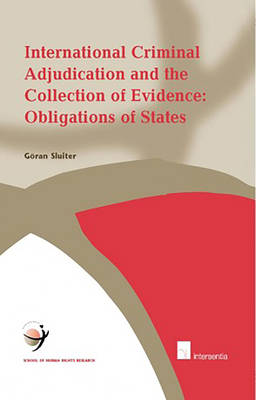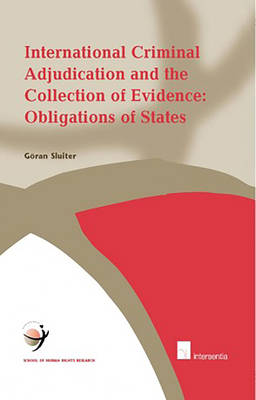
- Afhalen na 1 uur in een winkel met voorraad
- Gratis thuislevering in België vanaf € 30
- Ruim aanbod met 7 miljoen producten
- Afhalen na 1 uur in een winkel met voorraad
- Gratis thuislevering in België vanaf € 30
- Ruim aanbod met 7 miljoen producten
Zoeken
International Criminal Adjudication and the Collection of Evidence: Obligations of States, 16
Obligations of States
Goran Sluiter
€ 97,45
+ 194 punten
Omschrijving
The international criminal tribunals for the former Yugoslavia and Rwanda and the recently established permanent international criminal court all need the assistance of States to function effectively. To that end, there is a duty for (certain) States to provide the necessary assistance. It is, however, uncertain what the exact content of this duty is and whether it is sufficient in the light of fair and effective international criminal adjudication. This book aims at determining the content of the duty to co-operate with the existing international criminal tribunals in the field of evidence gathering. It contains an analysis of the power to request assistance and an analysis of the corresponding duty to provide that assistance. Special attention is given to State co-operation related to testimonial evidence and on-site investigations, as two particularly useful forms of assistance. This study serves the ultimate purpose of answering the question whether the 'legal assistance regimes' of the international criminal tribunals for the former Yugoslavia and Rwanda and the permanent international criminal court enable these bodies to fulfil their mandates.
Specificaties
Betrokkenen
- Auteur(s):
- Uitgeverij:
Inhoud
- Aantal bladzijden:
- 444
- Taal:
- Engels
- Reeks:
- Reeksnummer:
- nr. 16
Eigenschappen
- Productcode (EAN):
- 9789050952279
- Verschijningsdatum:
- 26/09/2002
- Uitvoering:
- Paperback
- Formaat:
- Trade paperback (VS)
- Afmetingen:
- 165 mm x 235 mm
- Gewicht:
- 793 g

Alleen bij Standaard Boekhandel
+ 194 punten op je klantenkaart van Standaard Boekhandel
Beoordelingen
We publiceren alleen reviews die voldoen aan de voorwaarden voor reviews. Bekijk onze voorwaarden voor reviews.








